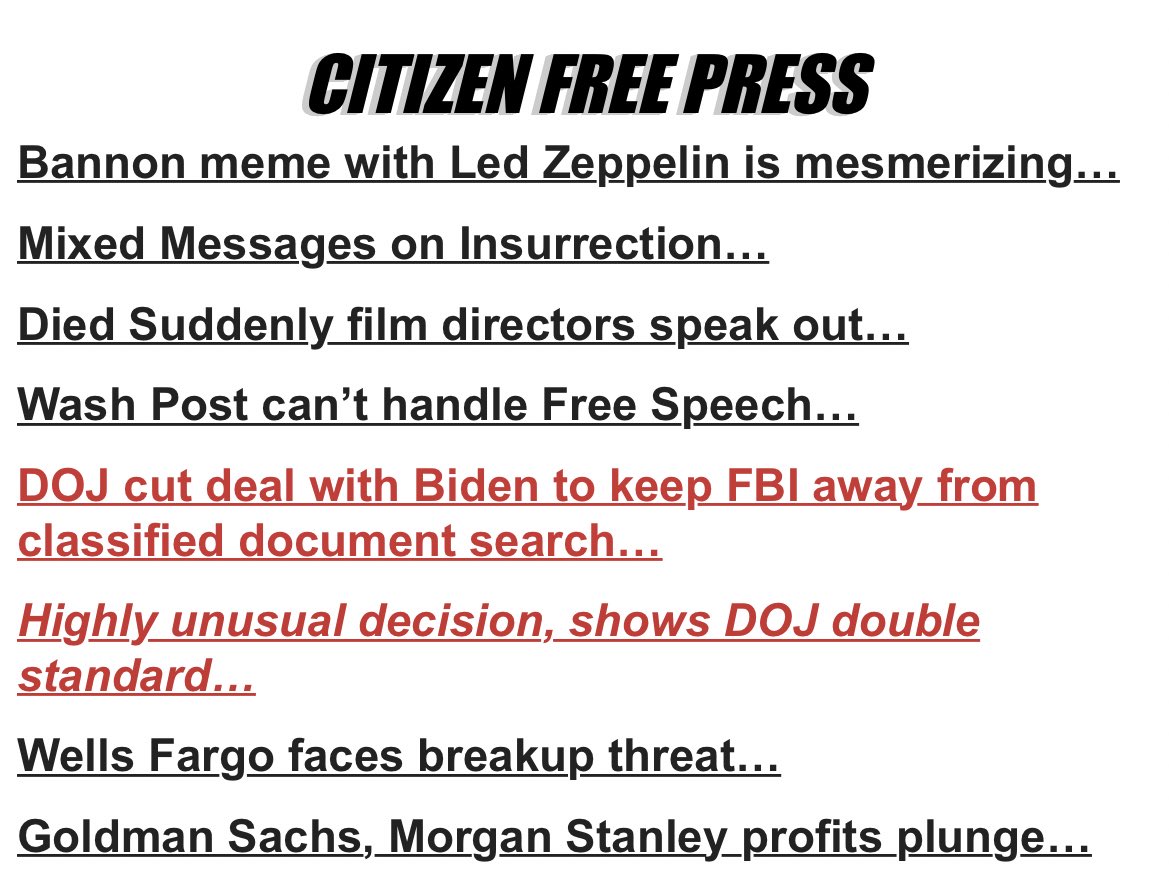Have you ever wondered why the news you consume feels like it's pushing a specific agenda? Or maybe you've noticed how certain stories dominate headlines while others are completely ignored? Well, buckle up, because we're diving deep into the world of citizen free press bias – a phenomenon that's shaping the way we perceive reality.
Let's face it, the media isn't as neutral as it claims to be. Whether it's through selective reporting, sensationalism, or outright omission, bias in journalism is a real thing. But here's the kicker – with the rise of citizen journalism, the lines between traditional media and user-generated content have blurred, leading to a whole new set of challenges. So, what does this mean for you, the average consumer of information? Stick around, because we're about to break it down for you.
This isn't just about pointing fingers or playing the blame game. It's about understanding how bias works, why it matters, and most importantly, how you can navigate the complex landscape of modern media. Because let's be real, if you're not careful, you might end up drinking the Kool-Aid without even realizing it. Now, let's get into it, shall we?
Read also:Unlocking The Power Of Best Ssh Remoteiot Your Ultimate Guide
What Exactly is Citizen Free Press Bias?
In a nutshell, citizen free press bias refers to the tendency of ordinary people – not professional journalists – to report news in a way that reflects their personal beliefs, values, or interests. Think about it – when someone posts a viral tweet or shares an article on social media, they're often doing so because it aligns with their worldview. And while that might seem harmless, the cumulative effect can be pretty significant.
Here's the deal: traditional media outlets have editorial standards, fact-checking processes, and accountability mechanisms in place to ensure accuracy. Citizen journalists, on the other hand, often operate without these safeguards. This doesn't mean they're intentionally misleading you, but it does mean that their reporting can be influenced by unconscious biases or even deliberate agendas.
How Does Bias Creep Into Citizen Journalism?
Now that we've established what citizen free press bias is, let's talk about how it actually happens. It's not as simple as someone deliberately twisting the truth – sometimes, it's more subtle than that. Here are a few ways bias can sneak into citizen journalism:
- Selective storytelling: Citizen journalists might focus on certain aspects of a story while ignoring others, depending on what resonates with their audience.
- Emotional appeal: Because social media thrives on engagement, citizen journalists often use emotionally charged language to grab attention, which can distort the facts.
- Confirmation bias: People tend to seek out information that confirms their pre-existing beliefs, and citizen journalists are no exception.
- Lack of context: Without access to the resources and expertise of professional journalists, citizen reporters might fail to provide the full picture.
The Rise of Citizen Journalism
Before we dive deeper into the issue of bias, let's take a step back and look at how citizen journalism became such a big deal. In the age of smartphones and social media, anyone with an internet connection can become a reporter. Platforms like Twitter, Facebook, and Instagram have democratized the flow of information, giving ordinary people a voice that was once reserved for professional journalists.
But here's the thing – while citizen journalism has its benefits, such as providing on-the-ground coverage during breaking news events, it also comes with its fair share of challenges. For one, the sheer volume of information can be overwhelming, making it hard to separate fact from fiction. And when bias enters the mix, it can create a perfect storm of misinformation.
Benefits and Drawbacks of Citizen Journalism
Let's break it down:
Read also:Unveiling The Mysteries Of Sone 436 A Deep Dive
- Benefits: Citizen journalism can provide diverse perspectives, fill gaps in traditional media coverage, and empower marginalized voices.
- Drawbacks: It can also perpetuate bias, spread misinformation, and lack the accountability mechanisms of professional journalism.
Why Does Bias in Citizen Journalism Matter?
Okay, so we've established that bias exists in citizen journalism. But why should you care? Well, here's the thing – the information you consume shapes the way you think, feel, and act. If the news you're exposed to is skewed by bias, it can distort your perception of reality. And in today's hyper-polarized world, that's a big problem.
Think about it – when you're constantly bombarded with biased information, it can reinforce your existing beliefs and make it harder to see things from other perspectives. This creates echo chambers, where people only engage with content that aligns with their worldview. And when echo chambers form, it becomes increasingly difficult to have constructive conversations or find common ground.
The Impact of Bias on Society
Bias in citizen journalism doesn't just affect individuals – it has broader societal implications as well. Here are a few examples:
- Polarization: When people are exposed to biased information, it can deepen political and social divides.
- Misinformation: Biased reporting can contribute to the spread of false or misleading information, which can have real-world consequences.
- Trust erosion: As people become more aware of bias in journalism, trust in the media as a whole can decline.
How to Spot Bias in Citizen Journalism
So, how can you tell if a piece of citizen journalism is biased? Here are a few red flags to watch out for:
- Emotional language: If a story is designed to evoke a strong emotional response, it might be trying to manipulate your feelings rather than inform you.
- Lack of sources: Reputable journalism relies on credible sources to back up claims. If a story lacks evidence or attribution, it could be biased.
- One-sided perspective: If a story only presents one side of an issue without acknowledging alternative viewpoints, it might be biased.
Of course, spotting bias isn't always easy – sometimes it's subtle, and sometimes it's intentional. But by staying vigilant and critically evaluating the information you consume, you can become a more informed and discerning news consumer.
Tools and Techniques for Identifying Bias
Here are a few tools and techniques that can help you spot bias in citizen journalism:
- Fact-checking websites: Use resources like Snopes, FactCheck.org, or PolitiFact to verify claims and identify misinformation.
- Media bias charts: Visual aids like the AllSides Media Bias Chart can help you understand where different outlets fall on the bias spectrum.
- Cross-referencing: Compare multiple sources to get a more balanced view of a story.
Case Studies: Examples of Citizen Free Press Bias
To better understand how bias manifests in citizen journalism, let's look at a few real-world examples:
Case Study 1: During the Arab Spring, citizen journalists played a crucial role in documenting protests and sharing information with the world. However, some reports were later found to be biased or inaccurate, leading to confusion and misinformation.
Case Study 2: In the wake of natural disasters, citizen journalists often provide on-the-ground coverage that traditional media can't match. But without proper context or verification, their reports can sometimes exaggerate the severity of the situation.
Learning from Mistakes: How to Improve Citizen Journalism
While citizen journalism isn't perfect, it can still be a powerful force for good. Here are a few ways citizen journalists can improve their practices:
- Fact-checking: Take the time to verify information before sharing it.
- Transparency: Be upfront about your biases and limitations.
- Collaboration: Work with other citizen journalists to provide a more balanced perspective.
The Future of Citizen Journalism
As technology continues to evolve, so too will the landscape of citizen journalism. Emerging tools like AI-powered fact-checking and blockchain-based verification systems could help address some of the challenges associated with bias. But at the end of the day, it all comes down to individual responsibility – both for citizen journalists and the people consuming their content.
So, what does the future hold? Will citizen journalism become more professionalized, or will it continue to operate in its current, Wild West-like state? Only time will tell, but one thing's for sure – the role of citizen journalists in shaping public discourse is only going to grow.
What Can You Do?
Here's the bottom line: you have the power to make a difference. By educating yourself about bias in citizen journalism and critically evaluating the information you consume, you can help create a more informed and engaged society. And who knows – maybe one day you'll become a citizen journalist yourself!
Conclusion: Embracing a Balanced Perspective
Let's recap: citizen free press bias is a real issue that affects the way we consume and interpret information. While citizen journalism has its benefits, it also comes with challenges, including the potential for bias. By understanding how bias works and learning how to spot it, you can become a more discerning news consumer.
So, what's next? We encourage you to share this article with your friends and family, start conversations about media literacy, and most importantly, stay curious. Because in a world where information is power, being informed is the first step toward making a difference.
Table of Contents


